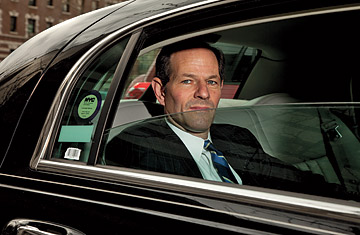
Spitzer has the resources to tackle any challenge — except maybe another campaign
(3 of 3)
The Tear in the Fabric
The previous night's interview with Harold Ford still weighed on Spitzer as he hovered in the green room at Comedy Central. Was the impudent comedian likely to destroy Spitzer's chances at a second life or amplify them? Spitzer wasn't sure. One of the producers came in and sat down.
"So, um ..." Spitzer said, leaning toward her, his voice dropping. "Did Harold Ford know he was going to get questions like that?"
"No," the producer said.
"Was he upset afterward?" Spitzer asked. "I don't know," the producer replied. "He said it was fun."
In the end, Spitzer muddled through his interrogation, laughing off a few well-placed jabs. He was still sporting the clownish TV makeup later in the evening when he entered a nearby restaurant called Taboon. The maître d' scrambled to make room for him, as if Lindsay Lohan had just swept in with an entourage. "I hope it came across in the Colbert thing that we haven't put any remedies [for the financial system] in place," Spitzer was saying. He ordered a Scotch and soda. "Barack is still listening to the same people. None of the questions he asked were the ones he should have been asking." He said he hoped the Administration would use the Massachusetts Senate loss "to assert the progressive agenda that people thought [he] stood for" rather than retreat to the center. Oh, and Obama should be listening more to Paul Volcker.
Perhaps Spitzer's re-emergence is a sign that he has smoothed things over with his family. His wife, after all, appears to have forgiven him. "I don't know if you can ever mend something like this, in the sense of repair the canvas so that you never see the tear in the fabric," he said. "I'm incredibly lucky to be with a woman who is willing to deal with that tear in the fabric and keep moving forward." Asked why he didn't simply have an affair, he said, "I know this is parsing it very thin, but the emotional component would have in some ways been a worse violation." In other words, he might still be governor, but he probably wouldn't be married.
I spent several years as an analyst on Wall Street, watching Spitzer's crusades against corrupt stock research and rigged IPOs play out around me, defending his actions to colleagues who ranted that he was motivated only by political ambition. To learn that Spitzer was the world's biggest hypocrite, that he'd thrown it all away to frequent prostitutes, was devastating, a lapse that could never be forgiven.
When I mentioned this to him, he looked out across the bar. "How do you think I feel?" he said, his eyes welling up. "I know exactly how you feel. At one point I stood for something that was important and useful. I was in a place in time where I had a purpose, where it mattered. And then I destroyed it."
Suddenly, a young man approached him. "Excuse me, sir, will you autograph this?" he asked, holding out his receipt. "My name is Ed." Spitzer signed the receipt and handed it back to him. "I've learned that there is no privacy anymore," he said, sighing. "It's funny. I went from being nobody when I was elected attorney general to then becoming, in a very twisted way, a celebrity." He went on to note that everything that is good and bad about him is now visible for the entire world to see and discuss — his own reality-TV show indeed. "It's weird," he said. "I feel as though my life — have you seen The Truman Show, that movie? — I kind of feel as though that's my life."
Spitzer finished his drink and gathered his coat. "At some point I may go back to a more private world, but it just hasn't happened," he said. With that, he went out into the snow to make his way home.
